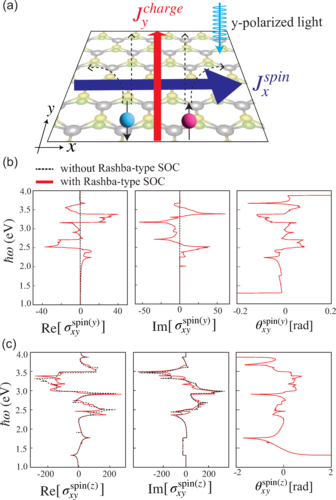Research on optically induced spin Hall current in Janus transition metal dichalcogenides by Professor Katsunori Wakabayashi published in Physical Review B
Professor Katsunori Wakabayashi (School of Engineering, Kwansei Gakuin University) and Mr. Tomoaki Kameda (Ph.D. student, Department of Nanotechnology for Sustainable Energy) have theoretically demonstrated the generation of pure spin Hall currents under light irradiation in monolayer Janus transition-metal dichalcogenides (TMDCs). This work was published in Physical Review B on May 27, 2025
Monolayer Janus TMDCs, such as WSeTe, break both inversion and mirror symmetries, giving rise to an internal electric field and Rashba-type spin-orbit coupling (SOC). Using an effective tight-binding model and the Kubo formula, the authors calculated the spin-dependent optical conductivity and demonstrated that both in-plane and out-of-plane spin-polarized pure spin Hall currents can be generated efficiently under light irradiation. Importantly, the effect persists at room temperature, highlighting its robustness.
These findings provide a new design principle for next-generation optospintronic devices based on two-dimensional materials, including light-induced spin current harvesting and in-plane spin injection.
Journal name: Physical Review B
Article title: Optically induced spin Hall current in Janus transition metal dichalcogenides
Author(s): Tomoaki Kameda and Katsunori Wakabayashi
DOI: 10.1103/PhysRevB.111.195425


